- Home
- Charles L. Grant
The Sound of Midnight - An Oxrun Station Novel Page 4
The Sound of Midnight - An Oxrun Station Novel Read online
Page 4
The old woman was wearing a heavy dark overcoat and black scarf, the combination of which making her gray-white face all the more stark, her heavy black eyebrows all the more out of place. There was no use of cosmetics that Dale could see other than a patting of rouge on the flattened, hollow cheeks. And when she smiled, most of her teeth were stained yellow or dark brown.
And she was so small, her feet in their heavy black shoes were unable to touch the floor when she sat back.
"I'm Flora Campbell," she said, nodding just so while bone-thin fingers fumbled with her coat, opening it to her waist "Willy's aunt."
Dale could only stare. Phrases, trite and well-intentioned, jumbled her into stunned silence. The woman knew her discomfort and smiled again.
"My David tells me you were the one who found little Will in the pond."
"I . . . was," she said, her throat constricting and suddenly gone dry.
The woman lifted a hand and yanked the scarf from her head. Her hair, waist-long, was a shimmering white so youthfully gleaming Dale was unable to stifle a gasp. A smile. And suddenly she relaxed.
"You can tell an old woman a lot of things," Flora Campbell said, "but she seldom believes it until she sees it. I see you. And I'm here to tell you, young woman, that there'll be none of us who blame you for what happened today. None of us."
"Miss . . . Mrs. . . ."
"Flora, please. I've never married, and I think Miss is a little too much for a hag my age."
Dale nodded eagerly. "Flora. Thanks. And thank you for coming out tonight. I was really beginning to think Mr. Campbell was going to get the police after me or something. I mean, even the chief—"
"Abraham is a good boy, Miss Bartlett, and he does what he has to. David says do this and that, and Abraham must do this and that because David is the father of the boy. But David takes his grief in different ways. He doesn't like to believe in things like accidents. He demands a cause, you see. Always a cause."
Suddenly mindful of her role, Dale moved to stand. "Flora, would you like a cup of tea, or some water? It must be a long walk from your house to here. I'm sorry, but you startled me for a moment and I'm forgetting myself."
"Relax, child," the old woman said, waving her down again. "Relax, I'm not going to bite you, you know. I just thought you should know what it is we're thinking back home."
Dale looked down to her lap, to her hands twisting mindlessly. "I appreciate that, Miss Campbell, I really do. It's awfully kind of you."
"You knew my Will?"
She looked up quickly. Flora had leaned forward in the chair, shrinking her still further. Had it not been for the summer blue eyes and that incredible hair, Dale would have thought she was speaking with a corpse, or a Halloween-costumed youngster. "I knew him, yes, but not all that well. He came into the store to buy models once in a while, and with his friends. He bought ships, planes, things like that. Especially ships, though. He liked ships of all kinds."
"A sailor. He wanted to be a sailor," Flora said, her eyes roving the ceiling. "He spent much of his time in his room doing those things. The walls are full, and his mother always said she was going to throw them out. Of course, I wouldn't allow that, but she said it often." She straightened, crossed her ankles. "Did you see him today? Before, is what I mean. Did you see him before he went to the park?" Then a finger went up before Dale could answer. "I'm sorry for the questions, young woman, but understand that I'd like to know what it was he was doing today. His mother, too, and my David. It helps sometimes, you see."
Dale wasn't sure she saw at all, but if this is what the family wanted then she wasn't going to be the one to deny them. She explained what had happened in the store with the clipper ship and Mrs. Inness, and the joke the boy had tried to make with Bella's favorite phrase. It wasn't long in the telling, but she noticed the old woman's lips moving as if trying to memorize the conversation, to recall it verbatim for the boy's bereft parents.
"Did he not give you anything, then? A present or something of the like?"
Dale inexplicably remembered the figurine in the boy's hand, but saw no need to mention that here. The police, in fact, had most likely already returned it. "No, of course not," she said. "I'm not really in the habit of accepting gifts from my customers, Miss Campbell."
The woman waved her hands apologetically in front of her. "No, no, I didn't mean it like that. But Will was that kind of a boy, Miss Bartlett. He liked many people and always wanted to be giving them things. Like his father's work, for instance. After the poor man works so hard on them for hours, Will . . . Will, the poor wee boy, would take something that struck his fancy and give it to someone he liked. Like you, Miss Bartlett, I'm sure."
"Well," Dale said, "I'm sorry but he's never given me anything but a smile and a few bright moments during my day."
She didn't know why she'd said exactly that, but they seemed to be the right words for the moment. Flora caught her breath, released it in a sigh that lowered her gaze to the carpet for several long seconds. Then, without preamble, she pushed herself from the chair and was already in the foyer before Dale could recover and catch up with her.
"Are you sure you wouldn't like a drink of something before you go, Miss Campbell? I don't have a car or I'd offer you a lift home. Perhaps I could call a cab?"
"No, it's all right, dear. You've given me quite enough already."
Dale opened the door, walked across the porch as Flora climbed haltingly down the steps to the walk. Her hair was covered again, blended into the dark of her coat, and she was a shadow in the street before she reached the corner. Dale waved, not sure she was seen, then sat heavily on the top step.
To the east as far as she could see, the black wall of the park shadows seemed an almost tangible barrier. A car sped past in the wake of its headlights, its engine abrasive in the silence of the street. A mockingbird dropped from the huge maple in the front yard and soared over the house. One of these years, she thought, I'm going to put in a hedge or some fencing. The small lawn was already beginning to look worn and August-tired from the children who passed each day and used it for a wrestling mat on their way to and from school.
She waited, then, for the relief to come, the lifting of the weight that her imaginary guilt had grown, the lifting caused by the dispensation of the strange old woman.
She waited, and there was nothing.
Only an odd sense of coming in on the middle of a film without knowing the plot. Ordinarily she would have thought nothing of Miss Campbell's visit, but she realized in dismay that suspicion was fast becoming an active part of her nature; after all, the Campbells live a good two miles down the road—was it natural such an ancient creature should walk all that way to deliver a message she could have given over the telephone? On the other hand, perhaps she believed in the personal touch, that the words would seem more potent, and more sincere.
Then: on what other hand, she thought—what am I talking about?
She stood.
Good night, Willy Campbell, she said to the trees whispering to themselves in the park across the street. I hope you're still laughing.
CHAPTER III
June.
July.
Summer settled in with an enervating vengeance, a furnaced revenge for the respite of winter. Lawn sprinklers worked hourly, vainly, more use to the children who ran through them than the grass they watered. Cars moved sluggishly, pedestrians as though gravity had multiplied—and when it showered, there was a rising of steam from tarmac streets. Breezes became treasures, clouds good omens, and the air-conditioned stores were palaces from which few dared or desired to venture toward home.
With no holidays in sight, Dale left the store in Mrs. Inness' eager care and took a week off to paint the kitchen, rearrange the living room, tend her plants, and spend most of the late afternoons wandering through the shade of the park trees hoping to stumble across a lost plane ticket to somewhere in Alaska. By the end of the month and the last day free of Bella's complaining, she was bore
d. She wished she had taken Vic's halfhearted advice and found a resort someplace a thousand miles away, with beaches and breakers and tall cool drinks brought to her poolside lounge by white-coated valets. It would have been a change. A needed one, she thought; but she hadn't taken a vacation since her first year, when Bella had seized the opportunity to turn the store around to what it had been. By staying close to home, she told herself, she could pass by on accidental occasion and sneak a look inside to see that all was well. And whenever she did, there was Bella, glaring back at her and shaking her head, pointing a finger, mouthing a go away behind a not entirely sincere laugh.
She dined with Vic often, saw a few of her acquaintances when she felt like it, but generally shunned those who might bring up the misery of Willy Campbell's inquest. It had gone by fast enough, perfunctory and official, with the verdict expected and unprotested. But the sight of Dave and Milly Campbell sitting in the front row as she retold her story had been unnerving enough to put her to bed for the rest of the day. Dave had been pale, his great frame collapsed in defeat like a pricked balloon, and from Milly only an unconcerned stare as if she didn't much care.
The children still came to the store, Jaimie and Carl quietly vying for the leadership Willy had had.
For Willy was now a poignant memory. Even Bella seemed distressed for a while that he wasn't around to poke fun at her greeting.
It grew hotter.
It became August.
On a Sunday afternoon, Dale broke out of the oven her house had become and entered the park. The playing field was generally flat, but the east end rose to a gentle hill crowned thickly with pine and maple, a hill that served adequately for a long view of the bandstand halfway down, the field, the tops of the buildings in Oxrun's center. With a thermos of cold tea nestled against her side, she stretched out on the warm grass and cupped her hands behind her head. Heat hazed the sky and bleached the gold from the sun. She closed her eyes finally to the buzzing of invisible insects.
She wanted to think, to have a talk with herself about the evening before when Vic had taken her to the Chancellor Inn for a meal and a drink and a night of sweated frantic dancing; and after he had kissed her, standing on the bottom step of the porch, he had proposed. Awkwardly, shyly, he had taken her so by surprise that she'd demurred like some coy southern belle urging her man to wait until the war was over and he was home to stay. He'd taken it well, joked about it as he walked hurriedly back to his rust-streaked car; but there was a slump at his shoulders she'd never seen before, and pity had almost driven her to scream out an acceptance. He had gone, though, before the impulse had peaked, and she had slept badly. Weakly blaming it on the heat.
A shout from below, and she raised her head to see wildly cheering boys surrounding one of their fellows at home plate. A home run, she thought and applauded the feat silently before closing her eyes again.
Listening to the faint laughter.
Drifting.
Listening to the drone of a bee that hovered by her cheek, then sped off without lighting.
Listening to the rustle of her red print blouse as she took a deep breath and lifted her breasts, exhaled, and felt their weight pushing her further into the ground.
Drifting.
Dozing.
She was walking. Looking down. On water. Brown and deep and splotched below the surface with a green that had never seen the sun. Looking up. There was no shore. Only water, brown water that lay calm beneath a sky that rippled over invisible stars like a stream over pebbles.
A pace, and the water didn't move beneath her. Another, and a dragonfly as big as her fist exploded from nowhere to bump against her arm. She cried out, grabbed her forearm and saw the abrasion raising welts that bled, slowly. A drop at a time.
Another cheer. A breeze that moved the leaves above her to cast dappled shadows over her face. Spots, then, of cool and warm, and she turned her cheek onto the grass while one hand deserted the pillow and rested on her stomach.
Several yards ahead of her the brown water cleared. Still walking, not thinking of how she was staying afloat, she approached the uneven circle and looked down again. Bubbles. Small, rising, breaking through the surface and splashing into her face. A fetid stench jerked her face away, a stench that took on color as it drifted upward and waited. The color was brown, laced with green and purple and tendrils of white. The bubbles came faster, broke more violently, sent her scurrying to escape the odor that wrenched a gagging cough from her throat. The color hovered, coalesced, became a cloud that grew, whirling within itself and bobbing over the clear calm water.
Her fingers gripped satin fabric and pulled convulsively. Slowly the blouse worked out from her jeans, exposing her midriff, which grew hot instantly and beaded perspiration that ran down her side. Her lips opened, gulped, and her tongue flicked snakelike over them, leaving them dry. She swallowed, tossed her head to the other cheek and her freed hand joined the other. Within seconds her blouse was completely undone and one finger toyed with the bottom button.
The cloud rose as the bubbles fed it, rose and lost the green and the purple and the tendrils of white, replaced them with red and gold and great lances of black. All of it swirling, all of it contained within the stench that was brown, the stench that spread over the water and trapped her, forced her to her knees. She crawled; and suddenly, looking back over her shoulder at the cloud big as she, felt moisture on her bare feet. She was sinking. With every move another fraction of an inch. Hands to her knees she fought the pressure of the stench that downed her, and searched the level horizon for signs of land. A step, and she sank. A step, and she sank and began to cry when she realized she could not stop walking.
An ant with its partner scuttled over her forehead. She brushed at them, whimpered, rolled over onto her stomach.
She called out names, all the names she had known, but there was no one; and the bubbles were larger and the cloud was moving toward her and she was in the water to her knees and sinking faster. To her thighs, her shoulders, her neck, and the cloud hovered over her. She looked up, heard a voice. Whispering. Muttering. Murmuring. Words that made no sense in a language that had no meaning. And as the water reached her mouth and spilled acidly through her clenched lips, she saw a face smiling at her, nodding, covered with blades of drenched grass that dripped red slime and blinded her eyes.
Willy!
"Willy!" and she sat up, shaking, hugging herself as she looked around quickly. She slapped at her forehead where the ants had been, then shoved knuckles against her eyelids until she gasped at the pain.
"Brother," she whispered, glanced guiltily down the slope. But her cry hadn't been noticed. The game continued, the couples with their picnics and their children still settled around the bandstand waiting for the suppertime concert.
Freud, she thought as she grabbed a nearby trunk and hauled herself up, you'd have a field day with me, that's for sure.
She snatched a handkerchief from her hip pocket and wiped the perspiration from her arms and face, shuddering at the afterimage of the horror that had blinded her in the dream. Without thinking, she tossed the cloth away and moved carefully back through the trees to the path she'd taken to the top of the hill. As she crossed the low summit she passed through a small clearing obviously widened by hand. A large blackened patch in its center reminded her of Fred's complaint: the kids were evidently still holding their night-based parties, and she wished for a moment they would never be caught. Beer, hot dogs, awkward gropings in the lessons of sex—it was a time they shouldn't be denied and she had a feeling, a good one, that Fred wasn't trying all that hard.
There was no one else walking this deep in the park, and as soon as she found a bench she took it and held her head in her hands until dizziness passed and the world returned.
Yet it wasn't the dream itself that had frightened her but the fact that it was an apparent culmination of fragmentary nightmares that had been building over the past several weeks. The water had been there, and the walkin
g, and the bubbles rising from that clear patch in the brown. But fragments only, half remembered and soon forgotten shortly after she awakened.
Why now, she wondered. Why now and here and not home in bed? And why little Willy in that cloud two months after the funeral? It couldn't be residual guilt; there was no guilt at all as far as she was concerned. Both Dave's ancient aunt, and even Stockton, had assured her there was nothing more she could have done. No guilt, then. But . . . what?
She wiped a sleeve under her nose, tucked in her blouse, and began the meandering descent. She reached one of the refreshment kiosks in the middle of a circular tarmac island and finished three tall colas before her change ran out. Further, and she was abreast of the games and heard more clearly the shouts of the teams. A hundred yards more and she'd be at the entrance, but she felt too nervous to go home just yet, and definitely not up to a sneak look into the store. When she reached the sidewalk, then, she still hadn't made up her mind which direction to take. The library, cool and silent, was a possibility dismissed at the thought of meeting Nat Clayton, the head librarian, who kept the building open late on Saturdays for those who worked all week. Dale didn't think she'd be able to stop herself from relating her dream; and though she was friendly and not much older, Mrs. Clayton just didn't know her well enough to understand the fear that still clung to her shoulders in this broad August daylight.
A drink, she thought, and smiled, startling a woman and her husband as they passed her. A drink would be nice, but the Chancellor Inn was too far to walk. Only four blocks over and two down, but in Oxrun the blocks were nearly twice normal length and that she was definitely not up to managing just yet.
"For crying out loud, sit on the curb and wait to get run over," she told herself, and smiled more broadly when the couple snapped their heads around. "Nice day," she called, tossing her head, running her fingers through her hair. The couple only hurried away.

![[Oxrun Station] The Orchard Read online](http://i1.bookreadfree.com/i/03/17/oxrun_station_the_orchard_preview.jpg) [Oxrun Station] The Orchard
[Oxrun Station] The Orchard![Riders in the Sky - [Millennium Quartet 04] Read online](http://i1.bookreadfree.com/i/03/20/riders_in_the_sky_-_millennium_quartet_04_preview.jpg) Riders in the Sky - [Millennium Quartet 04]
Riders in the Sky - [Millennium Quartet 04]![Chariot - [Millennium Quartet 03] Read online](http://i1.bookreadfree.com/i/03/19/chariot_-_millennium_quartet_03_preview.jpg) Chariot - [Millennium Quartet 03]
Chariot - [Millennium Quartet 03]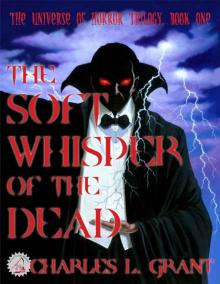 The Universe of Horror Volume 1: The Soft Whisper of the Dead (Neccon Classic Horror)
The Universe of Horror Volume 1: The Soft Whisper of the Dead (Neccon Classic Horror)![[Oxrun Station] Dialing The Wind Read online](http://i1.bookreadfree.com/i/03/19/oxrun_station_dialing_the_wind_preview.jpg) [Oxrun Station] Dialing The Wind
[Oxrun Station] Dialing The Wind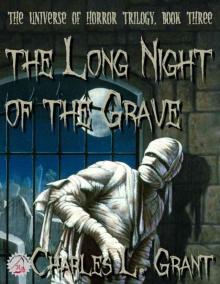 The Universe of Horror Volume 3: The Long Night of the Grave (Neccon Classic Horror)
The Universe of Horror Volume 3: The Long Night of the Grave (Neccon Classic Horror) The Grave - An Oxrun Station Novel (Oxrun Station Novels)
The Grave - An Oxrun Station Novel (Oxrun Station Novels)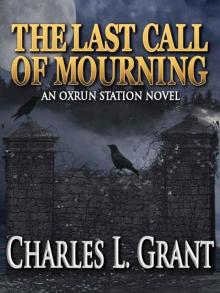 The Last Call of Mourning - An Oxrun Station Novel (Oxrun Station Novels)
The Last Call of Mourning - An Oxrun Station Novel (Oxrun Station Novels)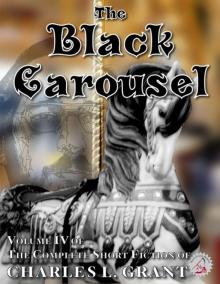 The Complete Short Fiction of Charles L. Grant, Volume IV: The Black Carousel
The Complete Short Fiction of Charles L. Grant, Volume IV: The Black Carousel The Bloodwind - An Oxrun Station Novel (Oxrun Station Novels)
The Bloodwind - An Oxrun Station Novel (Oxrun Station Novels)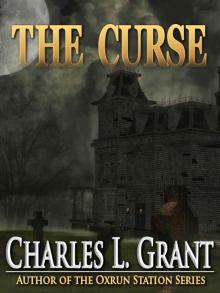 The Curse
The Curse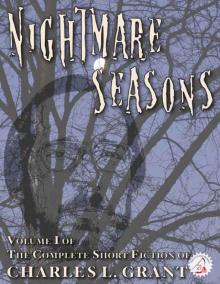 The Complete Short Fiction of Charles L. Grant Volume 1: Nightmare Seasons (Necon Classic Horror)
The Complete Short Fiction of Charles L. Grant Volume 1: Nightmare Seasons (Necon Classic Horror)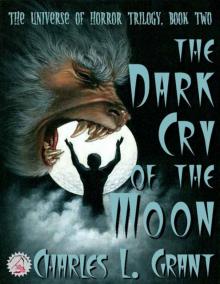 The Universe of Horror Volume 2: The Dark Cry of the Moon (Neccon Classic Horror)
The Universe of Horror Volume 2: The Dark Cry of the Moon (Neccon Classic Horror) Watcher: Based on the Apocalypse (World of Darkness : Werewolf)
Watcher: Based on the Apocalypse (World of Darkness : Werewolf)![[Oxrun Station] The Bloodwind Read online](http://i1.bookreadfree.com/i/03/25/oxrun_station_the_bloodwind_preview.jpg) [Oxrun Station] The Bloodwind
[Oxrun Station] The Bloodwind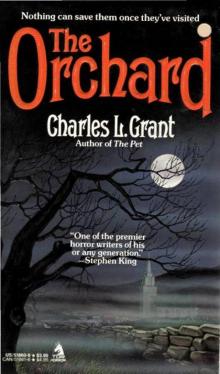 The Orchard
The Orchard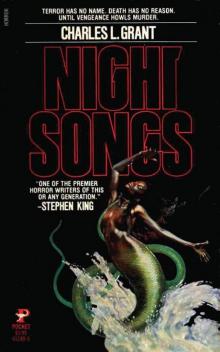 Night Songs
Night Songs Shadows 3
Shadows 3![Symphony - [Millennium Quartet 01] Read online](http://i1.bookreadfree.com/i1/04/02/symphony_-_millennium_quartet_01_preview.jpg) Symphony - [Millennium Quartet 01]
Symphony - [Millennium Quartet 01] The Hour of the Oxrun Dead (Necon Classic Horror)
The Hour of the Oxrun Dead (Necon Classic Horror)![In the Mood - [Millennium Quartet 02] Read online](http://i1.bookreadfree.com/i1/03/31/in_the_mood_-_millennium_quartet_02_preview.jpg) In the Mood - [Millennium Quartet 02]
In the Mood - [Millennium Quartet 02]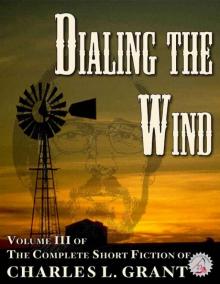 The Complete Short Fiction of Charles L. Grant Volume 3: Dialing the Wind (Neccon Classic Horror)
The Complete Short Fiction of Charles L. Grant Volume 3: Dialing the Wind (Neccon Classic Horror)![[Oxrun Station] The Last Call of Mourning Read online](http://i1.bookreadfree.com/i2/04/05/oxrun_station_the_last_call_of_mourning_preview.jpg) [Oxrun Station] The Last Call of Mourning
[Oxrun Station] The Last Call of Mourning The Pet
The Pet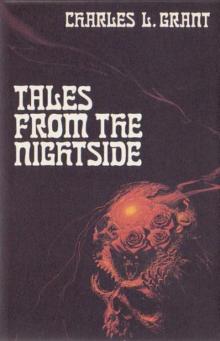 Tales from the Nightside
Tales from the Nightside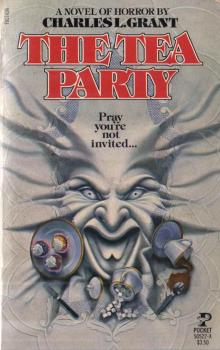 The Tea Party - A Novel of Horror
The Tea Party - A Novel of Horror The Complete Short Fiction of Charles L. Grant Volume 2: The Orchard (Necon Classic Horror)
The Complete Short Fiction of Charles L. Grant Volume 2: The Orchard (Necon Classic Horror) Whirlwind
Whirlwind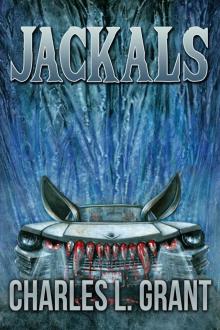 Jackals
Jackals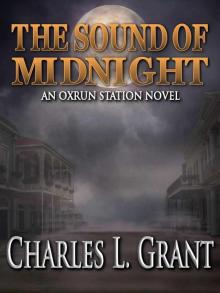 The Sound of Midnight - An Oxrun Station Novel
The Sound of Midnight - An Oxrun Station Novel